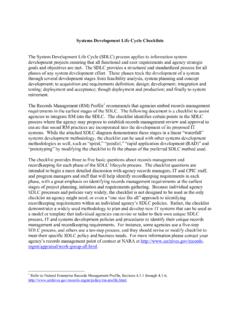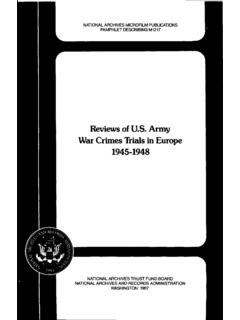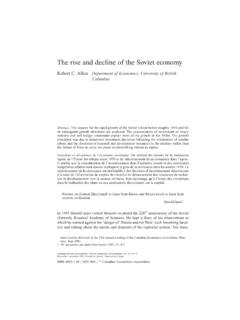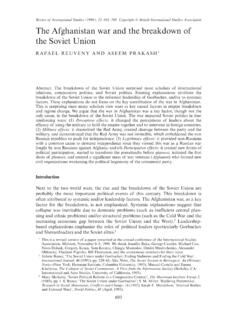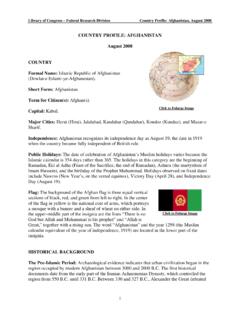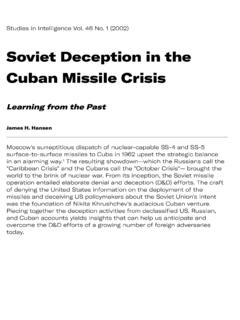Transcription of A Brief History of the Berlin Crisis of 1961 - Archives
1 A Brief History of the Berlin Crisis of 1961 Neil Carmichael National Declassification Center National Records and Archives Administration Autumn 2011 marks the 50th anniversary of the political Crisis that resulted in the erection of the Berlin Wall which divided that German city for 28 years. The National Declassification Center of the National Archives and Records Administration and the Historical Collections Division of the Central Intelligence Agency have partnered to publish newly declassified documents that reveal intimate details of the five month Berlin Crisis of 1961 . Included in this joint publication are newly released documents that show behind-the-scenes security discussions and planning. The Department of State has added a contemporary 600-page report, never before disclosed, on the impact of the events surrounding the Crisis and the deepening of the Cold War. Other documents explain the looming threat the Crisis represented to the legal status and rights of the three Western Powers in Berlin ; Britain, France and the United States, and provides a sense of the real-time spiral of statements, military acts, parry and feints, that led to international brinksmanship as the West went toe-to-toe with a USSR ready to annex or asphyxiate Berlin .
2 Events leading up to the Crisis 1958-1960 From the end of World War II in 1945, the question of Berlin s status 90 miles within the Deutsche Demokratische Republik (East Germany) and the soviet Unions zone of occupation, along with the status of Germany among the community of nations, remained a source of tension between the East and West. Premier Khrushchev continued to push President Eisenhower and the other Western leaders for resolution of the issue In November 1958, Khrushchev issued an ultimatum giving the Western Powers six months to agree to withdraw from Berlin and make it a free, demilitarized city. If the West did not come to agreement, Khrushchev declared that the German Democratic Republic had scrupulously observed the stipulations of the Potsdam Agreement with regard to the eradication of militarism and liquidation of the monopolies while the Western Powers had permitted the revival of militarism and economic imperialism in the German Federal Republic (State Department, 1962, p.)
3 2). He further threatened to turn over to a thuggish East Germany, complete control of all lines of communication with West Berlin ; the Western Powers then would have access to West Berlin only by permission of the obstinate East German government. These accusations from Khrushchev were nothing new and the three Western Powers responded by rejecting the statements as continued soviet propaganda, but the threat of turning over access to the DDR was something to be taken seriously and prepared for. In the end, the United States, United Kingdom, and France replied to the ultimatum by firmly asserting their determination to remain in, and to maintain their legal right of free access to, the entirety of Berlin . In May 1959, the soviet Union withdrew its deadline and met with the Western Powers in a Big Four foreign ministers' conference. The conference failed to bestow any important concessions by either East or West nor reach any general agreements on Berlin ; however, they did lead to Khrushchev's visit to the United States in September with Eisenhower at Camp David.
4 Eisenhower started the discussion on Berlin on September 26, explaining that Berlin was of deep concern not only for the US government but also US citizens. Eisenhower felt that once the tensions between the two countries over Berlin had been resolved, the US and soviet Union could begin productive dialogue and progress on numerous other issues. He stated that the US did not want to continue to maintain an occupation force in Berlin forever and agreed that the existing situation should be corrected. Khrushchev, for his part, specified that he was in general agreement with the President s statement but did not understand how the Soviets proposal for a free city of West Berlin could affect United States security. Khrushchev emphasized that the soviet s approach to the Berlin problem came from necessity; that is, ending the state of war and concluding a final peace treaty with Germany. He further charged that the United States with maintaining an abnormal situation and a virtual state of war because of the position taken by Chancellor Adenauer, and that the US should not endorse the Adenauer policies.
5 At the end of this visit, Khrushchev and Eisenhower jointly expressed that the most important world issue was general disarmament including the problem of Berlin and "all outstanding international questions should be settled, not by the application of force, but by peaceful means through negotiations." Khrushchev believed that an agreement with the US over Berlin was possible and agreed to continue the dialogue at a summit in Paris in May, 1960. But the Paris Summit turned out to be ill-fated, cancelled in the fallout from the soviet shoot down of an American U-2 reconnaissance plane and the capture of Gary Powers on 1 May 1960. New Administration: 1961 and the June Meeting in Vienna In the post-summit climate, the Kennedy-Nixon presidential race was not immune to the effects of increased soviet propaganda and numerous acts of physical harassment by the East German government turned into a belligerent display in support of soviet policies on Berlin , reinforcing the East German regimes claim that Berlin was within the territory of the GDR.
6 One writer characterized the post-summit conference phase of the Berlin problem as a cold war by proxy (Speier, 1962, p. 114). However, the harassment against Berlin met with failure because of successful Western countermeasures and a general lack of interest on the part of Khrushchev to continue negotiating outstanding issues with the Eisenhower administration. Khrushchev would later call the election of Kennedy a fundamental improvement in soviet -American relations (State Department, Feb. 1970, ). On January 6, 1961 , Khrushchev pronounced soviet support for ongoing national wars of liberation and further stressed that the Western powers must end their occupational regime in West Berlin (State Department, Feb. 1970, ). This was the belligerent and threatening environment that existed on January 20, 1961 , when John Kennedy took the oath of office as the 35th President of the United States. The new Kennedy administration initially made no strong policy statement in regards to Berlin , preferring to allow the Soviets to take the initiative in any provocative posturing.
7 Previously the US, after consultation with its allies, would put forward proposals concerning Berlin that were then rejected by the Soviets. The Kennedy administration did, however, confirm the US commitment to the security of West Germany and the people of Berlin . Over the next several months, the Kennedy administration met internally to discuss US contingency planning for any soviet move on Berlin . The developing US or western policy was one of allowing the Soviets to make initial proposals in regards to Berlin and its status. The State Department issued instructions that diplomatic replies to the Soviets were to recognize the unsatisfactory nature of the situation in Germany but that changing the status of West Berlin into that of a free city or a similar scheme would merely increase the abnormality of an already abnormal situation (State Department, Feb. 1970, p. 3) On June 4, 1961 , Khrushchev and Kennedy met in Vienna in hopes that the two could exchange views in a personal meeting.
8 Leading up to the summit, Khrushchev had welcomed a spirit of cooperation that was developing with the new administration and also expressed regret over the heated international atmosphere resulting from events in Cuba. During the summit, however, an emboldened Khrushchev demanded an immediate peace treaty to reunite Germany under Communist terms. That failing, as it must, he vowed to sign a separate peace treaty with Communist East Germany which, by his way of thinking, would then be unleashed to cut off free-world access to West Berlin . If a peace treaty were signed the state of war would cease and all commitments stemming from the German surrender would become invalid. This would apply to institutions, occupation rights, and access to Berlin , including the air corridors. (State Department, Feb. 1970, p. 41) The three Western powers replied that no unilateral treaty could abrogate their responsibilities and rights in West Berlin , including the right of unobstructed access to the city.
9 As the conversation over the status of Berlin grew more heated, Kennedy undercut his own bargaining position with the soviet Premier when Kennedy conveyed US acquiescence to the permanent division of Berlin . This misstep in the negotiations made Kennedy s later, more assertive public statements, less credible to the Soviets, who now saw him as indecisive and weak. The City Divided: August 13/14, 1961 During the early part of August, the foreign ministers of three occupation countries (the United States, United Kingdom, and France) met to discuss the diplomatic, propagandist and military aspects of the Berlin problem. (State Dept, Feb. 1970, p. 51) The US believed that the West German government should be associated more closely with contingency planning and be full-fledged partners of the work of the Ambassadorial Steering Group in Washington regarding Berlin . Hurriedly, ministers, military leaders, and heads of state discussed soviet motives and intentions, strengthening of the forces of the alliance, economic countermeasures, and Berlin contingency planning.
10 The ultimate goal was to be able to respond to any threat to Western access and at the same time deter the soviet Union from creating such a threat as a result of a peace treaty with the GDR. (State Dept, Feb. 1970, p. 51) In a final analysis, the Western Powers determined that the Soviets were unwilling to risk war and that any actions on their part would be more defensive in nature. Khrushchev, through Andrei Gromyko, the soviet Foreign Minister, reiterated to the Western Powers that if a treaty was not forthcoming, the Soviets would conclude a separate peace treaty with the DDR. The Soviets continued to apply pressure for resolution on the Berlin question. In his speeches of August 7 and 11, Khrushchev conjured up the specter of nuclear war with the west if pushed by the United States. He combined an aggressive stance with a posture of reasonableness by publicly asking for multilateral conferences but he offered no new proposals for negotiations and merely continued to insist that, if the Western Powers persisted in their refusal to sign a German peace treaty, this problem would have to be settled without them.


